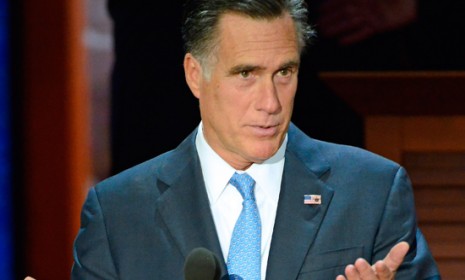The 47 percent debate: Do tax credits encourage the poor to work?
Mitt Romney says 47 percent of Americans are "dependent on the government." But the tax code is at least meant to help poor families become financially independent

A free daily email with the biggest news stories of the day – and the best features from TheWeek.com
You are now subscribed
Your newsletter sign-up was successful
Mitt Romney's campaign continues to reel from a secret video showing the candidate disparaging the 47 percent of Americans who pay no federal income taxes. Romney says those Americans — the bulk of whom are elderly and poor — are "dependent on the government," echoing an increasingly popular conservative idea that low-income families are mooching off the state and aren't paying their "fair share" of taxes. However, some conservatives continue to defend low taxes for poorer families, saying the policy encourages work and helps lifts people out of poverty. At the center of this debate is the Earned Income Tax Credit (EITC), which targets low- and middle-income households. Here, a guide to the economic implications of the 47 percent controversy:
What exactly is the EITC?
The EITC was established in 1975. The credit, then worth about $400, was "originally called the 'work bonus,'" says John D. McKinnon at The Wall Street Journal, since it went only to low-income taxpayers who had a job. The idea was to tackle poverty "without increasing welfare payments or raising the minimum wage," and was thus supported by many conservatives, say Annie Lowrey and Michael Cooper at The New York Times.
The Week
Escape your echo chamber. Get the facts behind the news, plus analysis from multiple perspectives.

Sign up for The Week's Free Newsletters
From our morning news briefing to a weekly Good News Newsletter, get the best of The Week delivered directly to your inbox.
From our morning news briefing to a weekly Good News Newsletter, get the best of The Week delivered directly to your inbox.
How has the EITC evolved since it was introduced?
Over time, across administrations both Republican and Democratic, the EITC was expanded, with Ronald Reagan describing it as "one of the best anti-poverty programs this country has ever seen." New anti-poverty credits, like the Child Tax Credit, only further reduced the federal tax burden of low-income families. The EITC is currently valued at $5,000 for a family with three children.
How many people can claim the EITC?
To qualify, a family with three children must make less than $49,000, a family with one child must make less than $41,000, and a childless working couple must make less than $18,700. "In 2009 alone, about 27 million families and individuals claimed the credit," says Nancy Cook at The National Journal.
A free daily email with the biggest news stories of the day – and the best features from TheWeek.com
Does it work?
Evidence strongly suggests that it does. The EITC is credited with pulling "the incomes of more than 5 million families over the federal poverty line each year," says Tony Pugh at McClatchy Newspapers. One study shows that the expansion of the EITC in the 1980s and 1990s "increased the number of single mothers participating in the workforce by more than 7 percentage points," says Cook. Another says the EITC during the Clinton administration led more than 500,000 families to transition from welfare to work. The EITC has also been linked to better test scores for poorer children, and to helping low-income families move into the middle class.
Does it come at a cost?
Yes. The EITC "currently costs the government about $60 billion a year," says McKinnon. However, many EITC recipients end up "paying more in taxes later on, as they move up the income ladder," says Brad Plumer at The Washington Post. And remember, about 60 percent of the $1.2 trillion in tax credits the U.S. government offers ever year goes "to the top income bracket," says Loren Steffy at The San Francisco Chronicle. "All of which makes a strong case for a sweeping overhaul of the tax code."
Sources: McClatchy Newspapers, The National Journal, The New York Times, The New Yorker, The San Francisco Chronicle, The Wall Street Journal, The Washington Post (2)